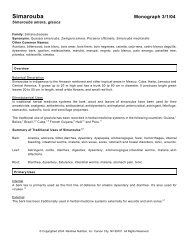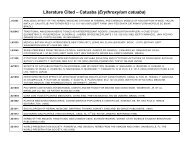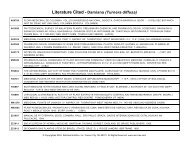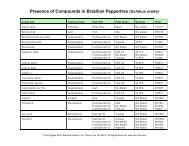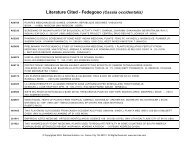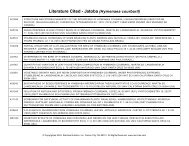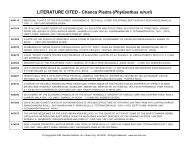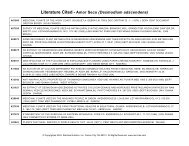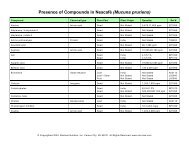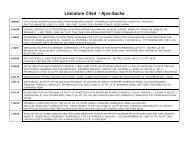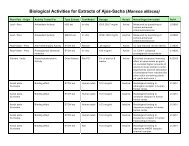Organ Specific Guide - Raintree Nutrition, Inc
Organ Specific Guide - Raintree Nutrition, Inc
Organ Specific Guide - Raintree Nutrition, Inc
Create successful ePaper yourself
Turn your PDF publications into a flip-book with our unique Google optimized e-Paper software.
BRAZILIAN PEPPERTREE EXTRACT<br />
Description: <strong>Raintree</strong> <strong>Nutrition</strong>'s concentrated Brazilian peppertree extract uses new and proprietary<br />
extraction methods to concentrate and preserve the active ingredients found in this rainforest tree.<br />
Concentration and extraction methods provide the equivalent of 500 mg of Brazilian peppertree bark per<br />
milliliter of extract.<br />
Traditional uses by organ or system: Cardiovascular: As a cardiotonic, for arrhythmia and mild<br />
hypertension.<br />
Ingredients: 100% pure Brazilian peppertree bark (Schinus molle) extracted in distilled water and 40%<br />
ethanol.<br />
Suggested Use: Take 60 drops (2 ml) 2-3 times daily or as needed.<br />
Contraindications: This plant has been documented with uterine stimulant and uterine antispasmodic<br />
actions in animal studies and should therefore not be used in pregnancy.<br />
Drug Interactions: None reported; however, this plant has been documented with hypotensive actions in<br />
animal studies. In light of such, it is conceivable that the use of this plant may potentiate antihypertensive<br />
drugs.<br />
Other Practitioner Observations and Possible Precautions:<br />
• Brazilian peppertree has demonstrated significant antimicrobial actions in laboratory studies. Supplementing<br />
the diet with probiotics and digestive enzymes is advisable if this products is used for longer than<br />
30 days.<br />
• For hypertension, Amazon Heart Support is better indicated than Brazilian peppertree alone.<br />
Synopsis of research: (Please the online Tropical Plant Database for Brazilian Peppertree for all cited<br />
research.)<br />
In Brazilian herbal medicine systems today, Brazilian peppertree is employed for heart problems<br />
(hypertension and arrhythmia), infections of all sorts, menstrual disorders with excessive bleeding, tumors,<br />
and general inflammation.<br />
Over the years, several research groups have conducted animal studies on Brazilian peppertree that<br />
have substantiated some of its many traditional uses in herbal medicine. In one study Brazilian peppertree<br />
was shown to lower blood pressure in dogs and rats, as well as to stimulate uterine activity in guinea pigs<br />
and rabbits. It has also demonstrated analgesic activity in mice and antispasmodic properties in rats and<br />
guinea pigs. In one human study, Brazilian peppertree was used to treat 100 patients with chronic cervicitis<br />
and vaginitis effectively. In 1995 and 1996, other researchers documented the anti-inflammatory properties<br />
of the plant once again.<br />
In laboratory tests, all parts of the tree have demonstrated potent antimicrobial properties. It displayed<br />
good-to-very strong in vitro antifungal actions against numerous fungi, as well as Candida. One research<br />
group indicated that the antifungal action was more effective than the antifungal drug Multifungin.® It has<br />
also demonstrated in vitro antibacterial activity against numerous bacterial strains (which probably explains<br />
why it is an herbal remedy for so many infectious conditions in its native countries). In 1996, a U.S. patent<br />
was awarded for an essential oil preparation of Brazilian peppertree as a topical bactericidal medicine used<br />
against Pseudomonas and Staphylococcus for humans and animals, and as an ear, nose, and/or throat<br />
preparation against bacteria. Another patent was awarded in 1997 for a similar preparation used as a topical<br />
antibacterial wound cleanser. In much earlier in vitro tests, Brazilian peppertree demonstrated antiviral<br />
actions against several plant viruses.<br />
In addition to these documented antimicrobial properties, Brazilian peppertree passed an anticancer<br />
plant screening program in 1976 by demonstrating antitumorous actions. More recently, in 2002,<br />
researchers in Argentina documented that it was toxic in vitro against a human liver cancer cell line.



